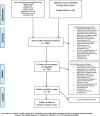Systematic review of experiences and perceptions of key actors and organisations at multiple levels within health systems internationally in responding to COVID-19
- PMID: 33962635
- PMCID: PMC8103061
- DOI: 10.1186/s13012-021-01114-2
Systematic review of experiences and perceptions of key actors and organisations at multiple levels within health systems internationally in responding to COVID-19
Abstract
Background: COVID-19 has presented challenges to healthcare systems and healthcare professionals internationally. After one year of the pandemic, the initial evidence on health system responses begins to consolidate, and there is a need to identify and synthesise experiences of responding to COVID-19 among healthcare professionals and other health system stakeholders. This systematic review of primary qualitative studies depicts the experiences and perceptions of organisations and actors at multiple levels of health systems internationally in responding to COVID-19.
Methods: Six main databases of biomedical information, public health and health administration research were searched over the period October 1, 2019, to October 21, 2020. Information extracted from included studies was analysed thematically.
Results: Thirty-four studies were eligible for data extraction. Nine of those studies, of lower methodological quality, were removed from the thematic analysis of study results. Considering the professional level experiences, predominant themes of the studies consisted of the new roles and responsibilities of healthcare workers, burnout and distress, recognition of ´unseen´ healthcare workers, and positive changes and emergent solutions amid the crisis. Organisational level findings of the studies included provision of psychological support, COVID-19 as "catalyst" for change, and exercise of more "open" leadership by managers and health authorities. Continuous training, regulation of working conditions, providing supportive resources, coordinating a diversity of actors, and reviewing and updating regulations were roles identified at the local health system level.
Conclusions: The experiences of frontline healthcare workers have been the focus of attention of the majority of primary qualitative studies as of October 2020. However, organisational and wider system level studies indicate that some responses to COVID-19 have been characterised by increased emphasis on coordination activities by local health system actors, making service adaptations at pace, and reliance on expanded roles of front-line workers. The need for theory-informed qualitative studies was identified at the organisational level.
Trial registration: CRD42020202875.
Keywords: COVID-19; Health administration; Healthcare workers; Qualitative; Systematic review.
Conflict of interest statement
The authors declare that they have no competing interests.
References
Publication types
MeSH terms
Grants and funding
LinkOut - more resources
Full Text Sources
Other Literature Sources
Medical


